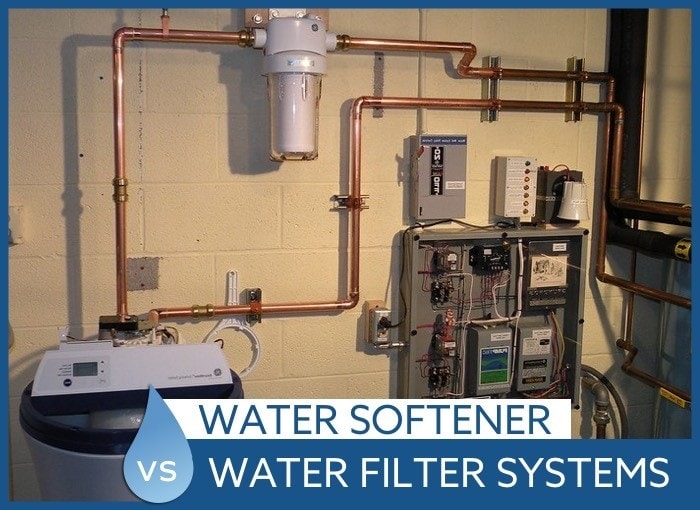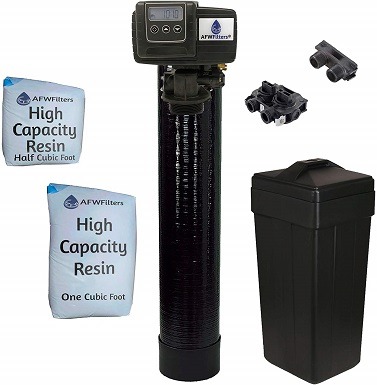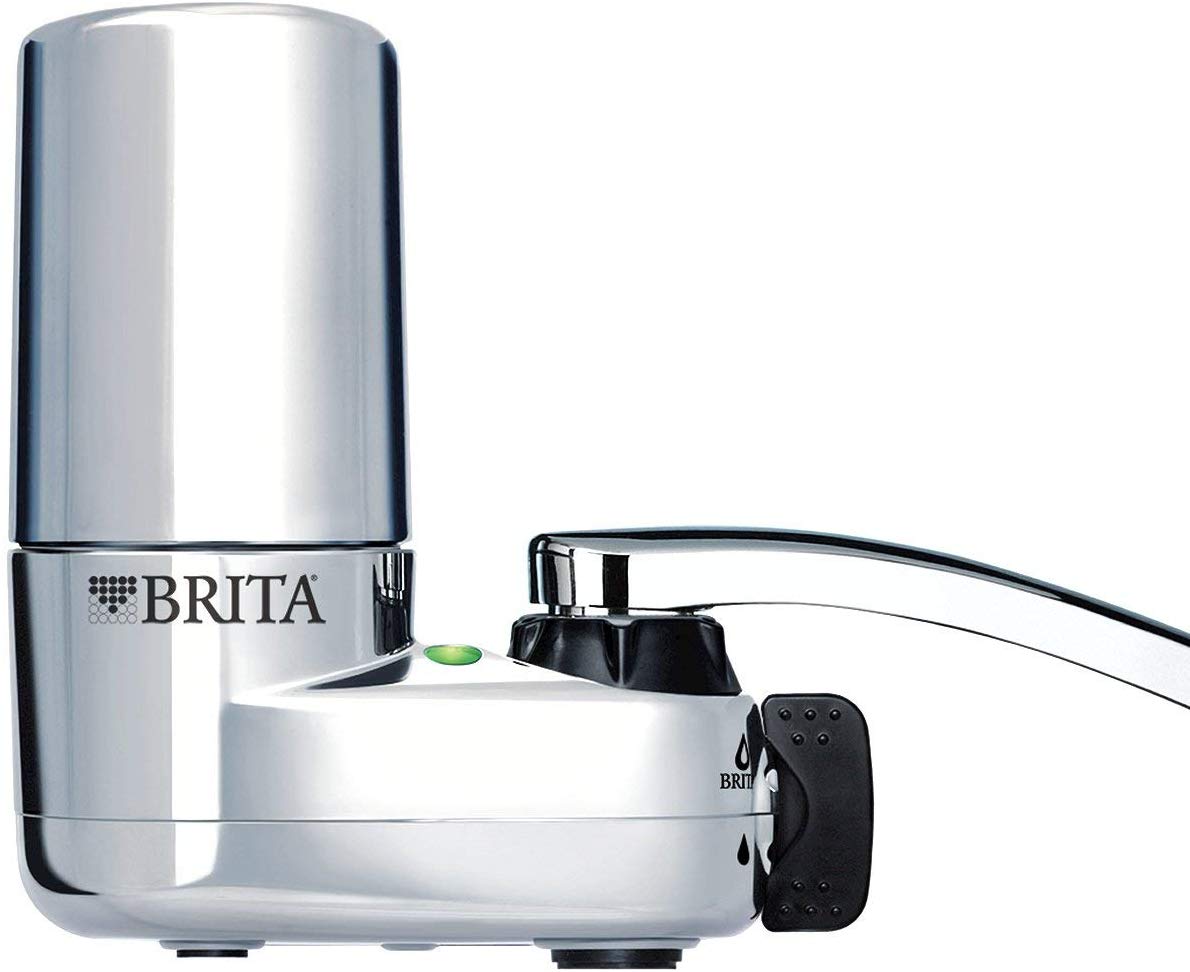Water Softener vs Water Filter Systems: What’s the Difference?
-
Pete Ortiz
- Last updated:

Water softeners and water filters both treat the water in your home, and if you didn’t know the differences between them, you might easily confuse one for the other. However, they’re not the same thing. They serve different purposes, albeit similar ones. In fact, a water softener is a type of water filter, but water filters are not always water softeners. In this article, we’re going to dig a bit deeper into each of these and figure out exactly what they are. Then, we’ll discuss the differences between them and determine what situations each one is best suited for. By the end, you’ll know exactly which one you need and what it can do for your situation.
What is a Water Softener?

If you’ve ever seen water spots or scale leftover on your shower walls, then you’ve seen the results of hard water. Scale caused by excess minerals in the water can appear on vehicles, mirrors, tiles—pretty much anywhere. This hard water can have other drawbacks such as wasting soap and staining of clothing. Certain regions are more susceptible to hard water than others and you’ll see the results of it all over if you live in such a region.
Water softeners remove the excess magnesium and calcium from your water by exchanging them for sodium molecules in an ion exchange process. These are the minerals that make your water hard, so removing them is called softening. Salt-free systems are also available, but these are really more like water conditioners than true water softeners since they don’t actually remove the minerals.
It can be a bit of an investment to get started with soft water, but there are many benefits. For instance, you won’t have water spots leftover on your dishes, vehicles, tiles, floors, tables, counters, etc. Soft water will also help you keep softer skin and healthier hair. Your soap and shampoo will also go further. Not just on you, but on your dishes as well.
You won’t be able to get a small capacity water softener as they are designed to treat the water for a whole house. This is because the benefits of soft water extend far beyond drinking it. Water softening systems also need to have very high flow rates so they don’t impede the normal flow of water in your home. For this reason, water-softening systems tend to be quite expensive.
Though it’s intended to remove excess minerals, water-softening systems do not remove all the necessary minerals for health. This means that softened water is great for drinking. Despite exchanging sodium molecules in place of the hard minerals, you won’t taste the salt since it only increases the salt content by a small amount overall.
- Softens water for the whole house
- Stops hard water spots
- Removes excess minerals
- Doesn’t remove contaminants
- Adds salt to the water
What Does a Water Filter Do?

While water softeners exchange the harsh minerals that cause water to be hard, water filters can completely remove all manner of contaminants from water. Some water filters will remove everything in the water at once while others are intended to remove only certain chemicals or contaminants. Most water filters remove bacteria and protozoa. Many filters will also remove viruses, heavy metals, chlorine, copper, and many other substances. They will also filter out sediment for a pure drinking experience.
Water filters can come in many different sizes. You can get filtration systems that filter water for the whole home, all the way down to water bottles with built-in filters that can only produce 20 ounces of clean water at a time. In between, there are many other options to choose from to provide whatever amount of purified drinking water you require. Some filters are for use in the wilderness to filter from natural water sources. Other filters are intended strictly for home use. Each one will also have different filtering abilities based on its intended use.
Each filter will have a certain size that it filters down to which is measured in microns. Some of the best filters will remove everything down to 0.2 or even 0.1 microns.
A water filtration system can be the answer to homes that have poor water quality. They can turn unhealthy water that could potentially poison you, into clean and safe water that’s excellent for drinking. More than just removing unwanted impurities in your water, filtration can also produce much better tasting water that’s far more enjoyable to drink.
- Removes contaminants
- Removes sediment
- Removes bad taste and discoloration
- Won’t remove limescale
When Do I need a Water Softener or a Water Filter?
Whether you need a water softener or a water filter depends on what problem you’re trying to solve. If your water is leaving hard spots on your tiles after a shower or on your vehicle after you wash it, then your problem is hard water. To solve this, a water softener will remove the excess minerals, which will eliminate the hard spots that are left after your water dries. Only a water softener will get rid of limescale, so a water filter will not suffice if hard water spots are the issue you need to solve.
A water softener is also the best choice if your water is leaving your skin and hair feeling dried out. By removing the hard minerals you’ll get softer water that’s better for your hair and skin and also helps your soap go further.
For most other water problems, a water filter is going to be your best bet. Whether you are concerned about impurities from old pipes, chemicals in the water, chlorine, or bacteria, a water filter will remove all of these and more. If you have discolored or poor-tasting water, then a filter can return it to its natural clear state and strip any bad taste from it. Filters can also remove protozoa and cysts from well-water and some can even remove viruses from compromised water sources.
Conclusion
Water softeners remove hard minerals by exchanging sodium molecules in their place. This will stop limescale from appearing and is healthier for your skin and hair. Water filters will remove contaminants, chemicals, odors, and bad taste to provide a purified drinking experience, but sometimes they can even remove the essential minerals. For hard water spots and dried-out skin and hair, you’ll want to choose a water softener system. To get pure and delicious drinking water, you’re looking for a water filtration system. After reading this article, hopefully, you understand the differences between these two similar devices, which will help you decide which one is right for you.
Featured image credit: Water Filter and Water Softener Installation by William Herron licensed by CC 2.0.
Contents



